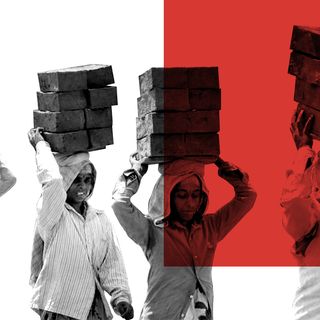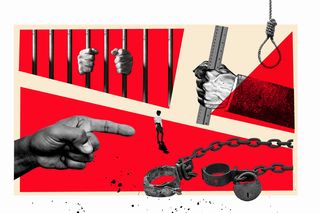
We Need to Stop Confusing Punishment With Justice
Social order has been built on the premise that punishment deters wrongdoing and provides catharsis to victims — but it doesn’t.

“Hang the rapists” once again became a rallying cry this month, as many in India raged over the rape and murder of a young Dalit girl. Moral outrage took over the media, with people wishing violent deaths for the oppressor-caste men who committed the atrocity. This reaction is not new in India. When a heinous crime is committed, people instantly react by baying for the criminals’ blood in the name of justice — the notion of which is rooted in a solitary concept: punishment. In the past, even laws have been enacted to mete out harsher punishments (such as after the 2012 Nirbhaya case), as an attempt to ‘fix’ the problem.
There’s just one issue: punishment of any kind, as research has repeatedly shown, does not deter crime, and it definitely doesn’t fix the systemic issues from which crimes stem. Yet Indian society continues to think punishment is the first, and only, way to right wrongs, in a vicious cycle that signals society’s brokenness and resulting helplessness.
The idea that punishment is the correct and only response to wrongdoing is instilled from a young age. Parents and teachers deal with truancy or any kind of undesirable behavior with punishment. However, this response, according to research, can cause even more aggression in children. In the long term, it leads them to associate violence with control and discipline, a tactic they then perpetuate in adulthood.
For example, one study involving parents in Scotland showed those who were smacked as children (as a method of discipline) were more likely to smack their own children to keep them in line. This pipeline is also painfully apparent in India, with parenting tactics still largely involving physical, verbal and emotional abuse to discipline young children. It’s also reinforced in schools, with teachers still meting out corporal punishment to children, often in front of their peers, despite the absolute bar codified in the RTE Act of 2009.
Related on The Swaddle:
Pinching, Shouting, Denying Food Among 30 Ways Indian Parents Abuse, Punish Children
Extrapolated, this has led us to structure societies around the idea of punishment, glorifying a punitive criminal justice system and violent and authoritative police forces that often lack accountability.
This is also bolstered by the collectivistic culture of Indian society, in which social harmony and order are of paramount importance. Norm violators are thus more likely to aggravate the collective conscience and evoke moral outrage. To deter norm violators, collectivistic societies, research shows, use collective punishment to pressure people to be interdependent, obedient, and nurturing. Thus, when horrific acts shock collectivistic communities, people, working through a violated collective conscience, rush to ‘correct’ the harm. The absence of systems that can respond to this harm in a holistic manner, such as in India, leads to punishment becoming the main way people are able to allay their collective conscience.
The pervasiveness of punishment in Indian society, however, does not automatically mean it’s effective. At an individual level, research shows punishing children does not deter them from engaging in the same behavior again, even causing severe mental health problems and antisocial behavior well into adulthood. This is because the swift, often intense act of punishment arouses strong emotional responses in those being punished but doesn’t necessarily help them change their behavior or introspect.
Paediatric associations have long tried to clarify for parents the distinction between discipline and punishment — while the former seeks to instil ideas of what’s right, the latter simply involves harassment and abuse for what’s wrong. Punishing children therefore is no guarantee that they learn good behavior for the future.
At a societal level, we see punishment — doled out by violent police forces, and a tedious, carceral legal process — failing to achieve its main objective: deterrence, or reducing the individual’s likelihood of committing the same harm again by inculcating in them a fear of severe consequences, according to research.
Related on The Swaddle:
Can Zapping People’s Brains Prevent Them From Committing Violent Crimes?
Punishment is different from accountability. While punishment involves admonishing people with no concept of a better way forward, accountability gives them the opportunity to take responsibility for their actions in an environment that is conducive to fixing past wrongs.
Today, the reason we punish wrongdoers is reduced to its most elemental, and only, utility — momentary catharsis, which is short-term and can potentially leave people feeling guilty, or worse, helpless. On a societal level, this catharsis often stems out of a need to avenge harm but does not necessarily help in the long term. This is true even for individual victims of the wrongdoing, seen in how survivors of rape themselves are lobbying against draconian punishment.
So we still stand by punishment as a concept out of empathy, which has stronger cultural roots in collectivistic cultures. This empathy, research shows, can quickly bolster the collective need to harm the perpetrator, in cases where no other harm redressal systems are possible. When supporting a victim, facilitating an apology, or creating a dialogue seem impossible tasks, the only avenue left is punishment, creating a momentary reward in our brains, even though it doesn’t serve any other purpose.
Ultimately, we’re left with a society that is highly socialized into this warped idea of punishment, while also incapable of effecting change, essentially playing out the same cycle again and again, fruitlessly.
The alternative to punishment, then, is prevention, be it in the form of a household that views discipline through the lens of positive reinforcement, or fair, equitable societies that reject the notion of retribution. The alternative is rehabilitation and restoration, which allow for self-reflection and mental health-focused methods of harm reduction, ultimately gunning for the betterment of both the wrong-doer and those that are wronged. It’s completely reworking the idea of justice, separating it from notions of blame and tying it to long-term healing and change. Because without effective avenues to identify and address harm and harm-doers, people will continue to resort to short-term gratification in the form of punishment despite knowing it won’t make a difference to the functioning of society.
On a psychological and sociological level, human beings are complicated, and so need to be the ways in which their wrongs are addressed. Taking the easy way out is lazy, but more importantly, it’s dangerous.
Rajvi Desai is The Swaddle's Culture Editor. After graduating from NYU as a Journalism and Politics major, she covered breaking news and politics in New York City, and dabbled in design and entertainment journalism. Back in the homeland, she's interested in tackling beauty, sports, politics and human rights in her gender-focused writing, while also co-managing The Swaddle Team's podcast, Respectfully Disagree.
Related


Transfer of Akbar v Ramani Defamation Case Reminds Us That Reporting Harassment Is A Long, Fraught Road
